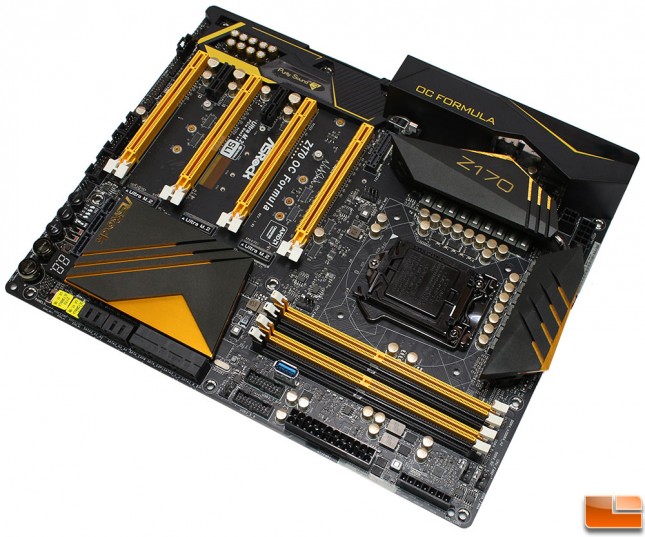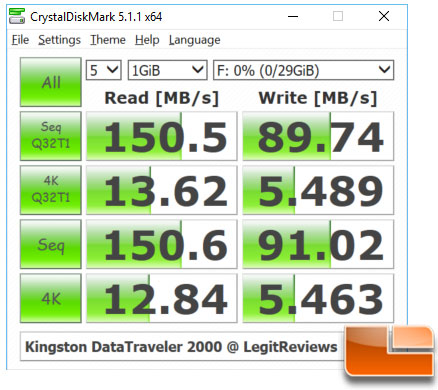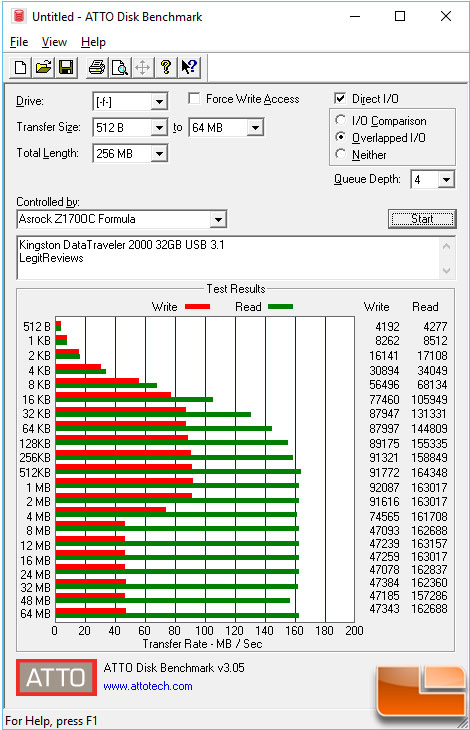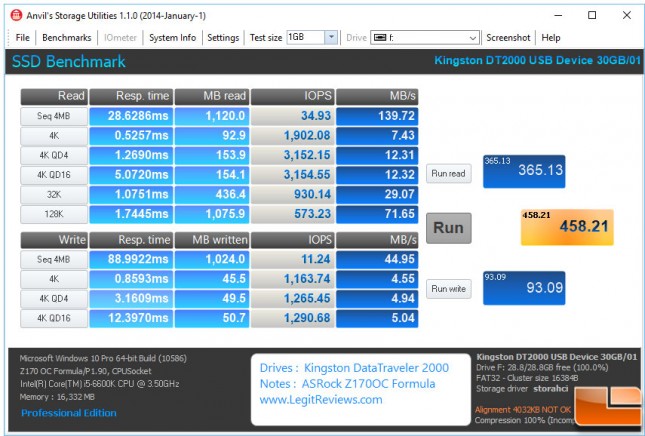Kingston DataTraveler 2000 Encrypted Flash Drive Review
Kingston DataTraveler 2000 Performance
To test the Kingston DataTraveler 2000, we will use the following test system. All testing is done on a fresh install of Windows 10 Pro 64-bit and benchmarks were run with no other software running.
| Intel Z170 Test Platform | ||
| Component | Brand/Model | Live Pricing |
| Processor | Intel i5-6600K | Click Here |
| Motherboard | ASRock Z170 OC Formula | Click Here |
| Memory | G.Skill TridentZ 16GB DDR4 3200 | Click Here |
| OS Drive | Samsung 256GB 950EVO | Click Here |
| Power Supply | Thermaltake Smart 850W Modular | Click Here |
| Video Card | EVGA GTX 970 | Click Here |
| Operating System | Windows 10 Pro 64-bit | Click Here |
CrystalDiskMark 5.1.1
CrystalDiskMark is considered one of the industry standards in evaluating performance of various storage medium. It provides a quick way to measure the sequential and random read/write speeds. In addition, it’ll test Sequential Read/Write with a Native Command Queue (NCQ) with a queue depth of 32.
Benchmark Results: On the ASRock Z170 OC Forumla, within Windows 10 Pro we found that CrystalDiskMark reported the Kingston DataTraveler 2000’s read speed was faster than it’s rated 135MB/s. The sequential write speed was double what we expected, going from a rated speed of 40MB/s to 91.02MB/s! The 4K speeds came in at 12.84MB/s and 5.46MB/s for the read/write results.
ATTO 3.05
ATTO is one of the older benchmarks that is still considered a standard test for drive performance. It will measure read and write performance across a specific volume length. ATTO then shows the results for each of the data sizes, making it easy to gauge performance.
Benchmark Results: ATTO shows that the Kingston DataTraveler 2000’s write performance was best with a medium sized data set, coming in at just over 90MB/s, while the read performance was pretty steady at any size data set once it got above 1MB, averaging 160MB/s. At the higher file sizes (above 4MB), the write speed went down to around the expected 40MB/s, coming in at 47MB/s
Anvil Storage Utilities 1.1.0
Anvil Storage is another benchmark that provides a good overview of the performance capabilities of a storage device. In addition to providing similar results to the previous tests, it also shows the IOPS (Input/Output Per Second), this is the maximum read/write operations per second, the higher the number the better and is directly related to making things run faster.
Benchmark Results: Taking a look at the Sequential ratings, Anvil gave the DataTraveler 2000, 139.72MB/s Read speed, and 44.95MB/s Write speed; neither of these two scores are far off from what we have seen in the other two test. For IOPS, Anvil is reporting 34.93 Sequential Read IOPS, and 11.24 Sequential Write IOPS. Of course as we look at the 4K the scores jump dramatically. Taking a look at other flash drives with faster Read/Write ratings, the IOPS on the DataTravler 2000 scored rather well, which is great, especially when we consider it is also encrypted.




